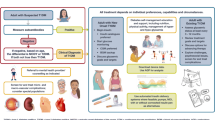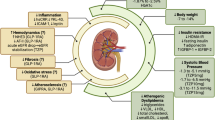Abstract
Background
Type 2 diabetes mellitus (T2DM) is a well-recognised complication of obesity. One of the microvascular complications of T2DM is diabetic retinopathy (DR). Bariatric surgery has been shown to effectively treat obesity and can induce remission of T2DM. It is not known what effect this improvement may have on pre-existing DR. We aimed to investigate this.
Method
A dual-centre, observer-blinded, case-control study investigated the progression of DR in patients who received Roux-en-Y gastric bypass (treatment group (TG)), compared with controls who received medical therapy (control group (CG)) for their T2DM. Retinal images were taken pre-operatively and approximately 2 years post-operatively for the TG and over a 2-year interval for the CG. Data were collected for confounding variables, including glycaemic control (HbA1c) and BMI.
Results
Forty-five patients were recruited (TG = 21, CG = 24). Groups were significantly heterogeneous. DR showed significant progression for those in the CG (p = 0.03) but not in TG (p = 0.135), no significant difference was found when adjusting for confounding variables (p = 0.480). There was a significant trend in favour of surgery in improvement of glycaemic control (p = 0.017).
Conclusion
The trends within these pilot data may represent a real difference in the progression of DR in patients who have received surgery, compared with medical treatment alone. Due to heterogeneity of group characteristics, further work needs to be done to validate these results. Should there be a true difference, there will be potential cost savings for the National Health Service (NHS) along with a reduced burden of disease for patients.
Similar content being viewed by others
References
National Obesity Observatory [Internet]. Oxford, Department of Public Health; c2010-2014 [Updated 2014, cited 2014]. One screen. Available from: http://www.noo.org.uk/NOO_about_obesity.
Foresight. Tackling obesities: future choices—project report. London: The Stationary Office, 2007 [Accessed 2014] Available from: http://foresight.gov.uk/.
Malnick SDH, Knobler H. The medical complications of obesity. Q J Med. 2006;99(9):565–79.
Hamdy O. Obesity. New York: Medscape; c1994-2014. [Accessed 8th March 2009] Available from: http://emedicine.medscape.com/article/123702-overview.
Sjostrom I. Lifestyle, diabetes and cardiovascular risk factors 10 years after bariatric surgery. N Engl J Med. 2004;351(26):2683–93.
Huang Z. Body weight, weight change and risk for hypertension in women. Ann Intern Med. 1998;128(2):81–8.
Datillo AM, Kris-Etherton PM. Effects of weight reduction on blood lipids and lipoproteins: a meta-analysis. Am J Clin Nutr. 1992;56(2):320–8.
Lavie CJ, Milani RV. Effects of cardiac rehabilitation, exercise training, and weight reduction on exercise capacity, coronary risk factors, behavioural characteristics and quality of life in obese coronary patients. Am J Cardiol. 1997;79(4):397–401.
Engerman RL. Pathogenesis of diabetic retinopathy. Diabetes. 1989;38(10):1203–6.
Ockrim Z, Yorston D. Managing diabetic retinopathy. BMJ. 2010;341:c5400.
The Diabetes Control and Complications Trial. N Eng J Med. 1993; 329(14):977–86.
UKPDS Group. Effect of intensive blood-glucose control with metformin on complications in overweight patients with type 2 diabetes. Lancet. 1998;352:854–65.
Klein R, Klein BE, Moss SE, et al. Glycosylated haemoglobin predicts the incidence and progression of diabetic retinopathy. JAMA. 1988;260(19):2864–71.
Buchwald H, Avidor Y, Braunwald E, et al. Bariatric surgery. A systematic review and meta-analysis. JAMA. 2004;292(14):1724–9.
Pories WJ, Swanson MS, MacDonald KG, et al. Who would have thought it? an operation proves to be the most effective therapy for adult onset diabetes mellitus. Ann Surg. 1995;222(3):339–52.
Torquati A, Lufti R, Abumrad N, et al. Is roux en Y gastric bypass surgery the most effective treatment for type 2 diabetes mellitus in morbidly obese patients? J Gastrointest Surg. 2005;9(8):1112–6.
Mun E, Blackburn G, Matthews JB. Current status of medical and surgical therapy for obesity. Gastroenterology. 2001;120(3):669–81.
Chaturvedi N. Effect of lisinopril on retinopathy in normotensive patients with type 1 diabetes. The EUCLID study group. EURODIAB controlled trial of lisinopril in insulin-dependent diabetes mellitus. Lancet. 1998;351(9095):28–31.
Schauer PR, Burguera B, Ikramuddin S, et al. Effect of laparoscopic Roux-En Y gastric bypass on type 2 diabetes mellitus. Ann Surg. 2003;238(4):467–83.
Pournaras DJ, Osborne A, Hawkins SC, et al. Remission of type 2 diabetes after gastric bypass and banding: mechanisms and 2 year outcomes. Ann Surg. 2010;252(6):966–71.
Sun C, Wang JJ, Mackey DA, et al. Retinal vascular calibre: systemic, environmental and genetic associations. Surv Ophthalmol. 2009;54(1):74–95.
Avogaro A, Albiero M, Menegazzo L, et al. Diabetes Care. 2011;34(Supplement 2):S285–90.
Kawasaki R, Tielsch JM, Wang JJ, et al. The metabolic syndrome and retinal microvascular signs in a Japanese population: the Fungata study. Br J Ophthalmol. 2008;92(2):161–6.
Wang JJ, Liew G, Wong TY, et al. Retinal vascular calibre and the risk of coronary heart disease-related death. Heart. 2006;92(11):1583–7.
Lammert A, Hasenberg T, Kraupner C, et al. Improved arteriole-to-venule ratio of retinal vessels resulting from bariatric surgery. Obesity. 2012;20(11):2262–7.
Gokce N, Vita JA, McDonnell M, et al. Effect of medical and surgical weight loss on endothelial vasomotor function in obese patients. Am J Cardiol. 2005;95(2):266–8.
Buse JB, Caprio S, Cefalu WT, et al. How do we define cure of diabetes? Diabetes Care. 2009;32(11):2133–5.
Pournaras DJ, Aasheim ET, Sovik TT, et al. Effect of the definition of type II diabetes remission in the evaluation of bariatric surgery for metabolic disorders. Br J Surg. 2012;99(1):100–3.
Acknowledgments
This pilot study was submitted for a Master of Science Degree, awarded by the University of Edinburgh and the Royal College of Surgeons of Edinburgh. The corresponding author would like to acknowledge Mr. J Featonby, Miss H Cook and Dr. C Walton for assisting with Diabetic Retinopathy Screening Databases and thus recruitment of cases and controls, Mrs. D Phillips for assistance with ethics and NHS site permissions and Mr. J A Higginson for proof reading, general advice and assistance with statistics.
Conflict of Interest
All authors declare no conflict of interest.
Statement of Informed Consent
Informed consent was obtained from all individual participants included in the study.
Ethical Approval
All procedures performed in studies involving human participants were in accordance with the ethical standards of the institutional and/or national research committee and with the 1964 Helsinki declaration and its later amendments or comparable ethical standards.
Author information
Authors and Affiliations
Corresponding author
Rights and permissions
About this article
Cite this article
Banks, J., Adams, S.T., Laughlan, K. et al. Roux-en-Y Gastric Bypass Could Slow Progression of Retinopathy in Type 2 Diabetes: A Pilot Study. OBES SURG 25, 777–781 (2015). https://doi.org/10.1007/s11695-014-1476-7
Published:
Issue Date:
DOI: https://doi.org/10.1007/s11695-014-1476-7




